Rebecca Smyth, Spain, SSH Blog Correspondent
Oh how time flies. This time last year I was wandering about what was then my new Barcelona neighbourhood. Today I’m back home in Ireland wondering where summer is.
And oh what I could be doing in Barcelona if I were still there. It’s festa major season you see, and what a season that is.
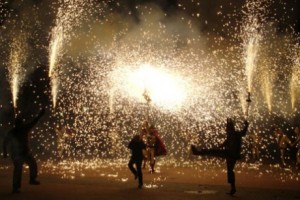
From the 24th of June (Sant Joan, for those of you taking notes) until, as far as I can tell, the 24th of June of the following year, every other day sees the celebration of a festa in one corner of Catalonia or another.
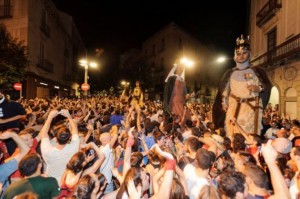
Festes are great. I want to import them here. For want of a better translation, they’re local, traditional festivals. They can be a one-day event or a two-week long blowout. What I like best about them is that there’s more to them than just the Degenerate Youth vomiting and brawling in the streets. You get kind of sick of seeing that if you grow up in Ireland. In point of fact, I witnessed no Degenerate Youth vomiting or brawling. Instead I saw people of all ages out until the wee hours of the morning taking part in processions and dances, watching open-air concerts, having water fights, having cook-outs in the street and generally just enjoying summer fun with family and friends. There may be some firework-related mayhem here and there, but what’s a lost finger or two among friends?
When I first arrived in Barcelona last year, the Festa Major de Sants was already in full swing. It’s not everyday that the new city you’ve just moved to throws a party for you, so I felt we were already off to a good start.
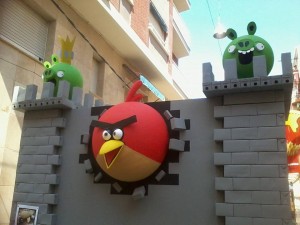
As part of the Festa Major de Sants many streets participate in a competition to see which one can come up with the best themed street design. I’m not entirely sure how or by whom it’s judged or whether anything more substantial than the honour and the glory is won, but that is irrelevant to this blog post (what is relevant will be revealed shortly, honest.) I wandered around for a couple of hours marvelling at the creativity, humour and effort that went into the street decorations, and marvelling all the more at the fact that groups of people get together and pick a theme and gather old bottles and clothes and scraps and cut and glue and stick and transform it all into Under the Sea or Pokémon or Angry Birds or Important Event in Catalan History or Witty Commentary on International News Events every single year because this is their neighbourhood and they love it and are proud of it. And then they turn around and plan a bunch of events suitable for all ages to take place in the now-decorated street.
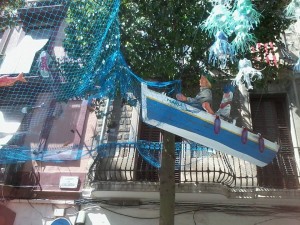
And this is just one neighbourhood. It happens all over Barcelona, in El Raval and Poble Sec and, most famously, in Gràcia. Apparently the street decorations there are a whole other level, but Muggins here can’t say for sure because Muggins here couldn’t really afford to stay in Barcelona until the Festa de Gràcia kicked off on the 15th.
All sounds peachy, doesn’t it? But there’s a but. There’s always a darn but, isn’t there?
Fortunately I didn’t experience any nastiness first hand, but this is patriarchy and that’s why we can’t have nice things. Assaults, harassment and general perviness ruin something that should be fun for far too many women and other Others.
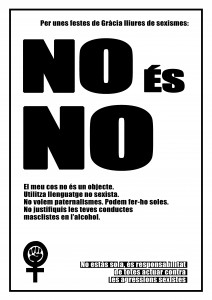
In response to this, numerous feminist collectives based in different Barcelona barrios and beyond have drawn up anti-harassment protocols in recent years. In 2012 the Asamblea de Dones Feministes de Gràcia (Assembly of Feminist Women of Gràcia) started the ball rolling with a poster campaign. The following year, they launched an awareness campaign featuring leaflets, posters and even radio advertisements. That summer also saw them draw up a proposed protocol against sexual harassment during festes majors. Primarily focused on their own ‘catchment area’, Plaça del Raspall, their activities and the protocol inspired other collectives involved in the Festa de Gràcia to take similar action. In both 2014 and 2015 the Asamblea and other collectives continued to campaign against sexual harassment and to provide support services to those who experienced it. It also inspired the barrio of Poble Sec’s les dones de La Base to draw up a campaign and protocol of their own this summer, to which many important groups involved in organising the Festes Majors de Poble Sec signed up.
La Asemblea de Dones Feministes de Gràcia’s 2015 protocol outlines how best to respond to different types of sexual harassment: non-physical harassment, physical harassment without force and physical harassment with force. In the case of the first two, the perpetrator is first warned that their behaviour will not be tolerated and, that if they continue, they will have to leave. If they continue, they are expelled from the festivities. In the case of violent physical harassment, they are immediately expelled.
Significantly, the Asamblea states in its protocol that it’s the person on the receiving end of any form of harassment to call the shots. If they feel like it’s harassment, then it’s frickin’ harassment. Organisers should only do what the person who has been harassed would like them to do. It also emphasises the importance of everyone being on the lookout for anti-social, sexist behaviour. Finally, and perhaps most importantly, the Asamblea also makes the point that those involved in organising the festivities should look to prevent harassment before it happens. This gives a whole new dimension to what ‘inclusivity’ can and should mean. For members of La Trama, a Sants-based feminist organisation, their anti-harassment campaigns in recent years aim “to show the rejection of sexist or homophobic violence by the organisers and the barrio.” Safe spaces can be fun spaces and fun spaces can be safe spaces, one hopes.
Writing this as my last blog was very much a deliberate thing: obviously it ties in nicely because the festes are currently ongoing, but most of all I wanted to write about something positive and something that reflected on the impressive grassroots activism that informs everyday life in Barcelona. Groups like La Trama, La Base, La Asamblea de Dones Feministes de Gràcia and many, many more have drawn upon and, to my mind, updated what can seem like fuddy-duddy concepts of community spirit and civic duty by giving them an intersectional feminist twist. It’s something I think we can all aspire to replicating in our own neighbourhoods, towns, university campuses and other communities. Failing that, we can all just move to Barcelona. Lovely weather you know.
The following article was a most helpful starting point and point of reference in writing this post.
For more information on the organisations mentioned, visit their websites:
* Asamblea de Dones Feministes de Gràcia
* La Base
Rebecca is currently living, working and stumbling through ballet classes in Barcelona. Originally from Kilkenny, she has a degree in European Studies and a Master’s in Gender and Women’s Studies from Trinity College Dublin, and will be doing an LLM in Human Rights Law in Edinburgh this fall.
